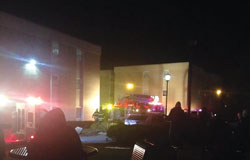Three University students have been criminally charged in connection with a fire that forced an evacuation of Cedar Hall, damaged University and student property, and temporarily displaced seven students whose suite suffered smoke damage, on Wednesday night, Feb. 26, according to University administrators.
At approximately 8:03 pm on Feb. 26, Cedar Hall was evacuated after the fire alarm was triggered by rising smoke inside the three bedroom suite on the third floor where the fire started, according to Raymond Gonzalez, Associate Director of Housing Operations.
The fire began in the entryway of the bedroom when a glass containing burning alcohol spilled onto the floor and ignited bedding and other surrounding personal items, William McElrath, Chief of the Monmouth University Police Department (MUPD), said.
Cedar Hall’s sprinkler system did not activate because the fire didn’t generate enough heat to trip the system, McElrath said.
MUPD was the first to respond to the scene, followed by the West Long Branch Fire Department and First Aid, and the Oakhurst Fire Department.
“The fire was out upon arrival of the Fire Department… I think that the first two initial responders, Corporal Al Acerra and Police Officer, Tracy Carretta, did an outstanding job,” McElrath said. “Carretta immediately grabbed the fire extinguisher and put out the fire, and Acerra ensured the safe evacuation of the building.”
According to McElrath, the fire did not spread to any other rooms, although “there was still a lot of smoke in the suite.”
The Cedar Hall residents were evacuated to the neighboring Spruce Hall basement instead of their normal recommended location near the underpass below Cedar Avenue because of the freezing temperatures outside. Cedar Hall houses approximately 115 freshmen, but Gonzalez indicated he wasn’t sure how many were present when the alarm went off.
Three police officers were treated for smoke inhalation but remained on duty, McElrath said. One of the students charged is a resident of the suite and suffered minor burns. The MUPD detective bureau conducted the investigation into the incident.
Jessica L. Pinto, an 18 year-old student from West Orange, NJ, Amanda Aynes, a 19-year-old student from Staten Island, NY, and Charlotte Von Hoffmann, a 19-year-old student from Montclair, NJ, were all charged with West Long Branch Ordinance 0.01-5, possession of alcohol by a person under the legal age to consume. Additionally, Aynes was charged with making alcohol available to persons under the legal age to consume, and Von Hoffmann was charged with N.J.S.A. 2C:17-2(c), creating a risk of widespread injury or damage, according to Grey Dimenna, Vice President and General Counsel at the University.
McElrath stated that the maximum penalty for underage possession of alcohol is a fine up to $250, distributing alcohol to minors carries a fine up to $1,000 with a maximum jail term of six months, and creating the risk of widespread injury is a fourth-degree crime with a maximum fine of $10,000 with a jail sentence up to 18-months.
“Fortunately, we don’t get many incidents like this,” McElrath said. “It’s a dangerous situation. Any time you talk fire, dorms and campus, it creates a hazard.”
Mary Anne Nagy, Vice President for Student Life and Leadership Engagement, said the three students that were criminally charged will also face Student Code of Conduct charges. “At the present time, we are still evaluating the situation to determine the charges that will be filed under the code of conduct but they could involve damage to property of the University or others; conduct that threatens or endangers the safety of another; violation of the alcohol policy, etc,” Nagy said.
Citing restrictions in the Family Educational Rights and Privacy Act (FERPA), Nagy said she is unable to disclose specific information regarding any disciplinary actions taken against the students. However, sanctions for those violations range from additional fines, service work assignments, residence hall suspension or expulsion, and suspension or expulsion from the University, according to the 2013-2014 student handbook.
Residents were allowed to return to Cedar Hall when it reopened at 9:35 p.m., but the seven students who resided in the suite that the fire occurred in had to be relocated until Friday while the room was cleaned by Facilities Management and aired out, Gonzalez explained. “[The students] were offered temporary housing in another building where we had vacancies. The majority of the room damage was just due to the smoke, however, there were a few student belongings that were damaged,” he said.
One Cedar Hall resident who asked to remain anonymous, said, “I was in my dorm room when I heard the fire alarm go off. I had just assumed it was a fire drill until I got outside and saw how serious it was. I got nervous because I didn’t want the worst to happen— having no building at all. It would’ve been devastating. Fires are so serious I think we play off the drills we have as a joke. This was no joke,” the student said, and added that the emergency personnel’s response was, “…Pretty immediate and I think it was handled well.”
The University conducts fire drills in the residence halls twice each semester or four times a year, Nagy said, and believes those drills helped the students efficiently evacuate Cedar Hall once the alarm activated. “To the best of my knowledge, all students left the building in a timely fashion, Nagy said. “Without a doubt these drills help. Students understand the importance of leaving our buildings in a timely fashion and adhere to that expectation.”
Nagy couldn’t recall the last time a building had to be evacuated due to a fire, but said, “…There are times where alarms go off and buildings have to be evacuated mostly due to food being cooked (or burnt) in the microwave.”
PHOTO COURTESY of Kendal Hand




